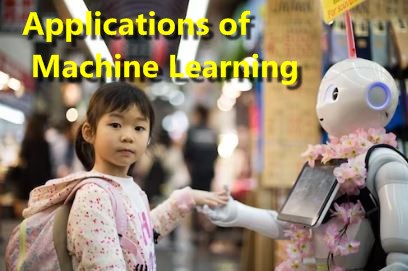Applications of Machine Learning – Machine learning has a broad range of applications across various industries and domains.

Here are some common applications of machine learning:
- Image and Video Analysis:
- Image Classification: Automatically categorizing images into predefined classes, such as identifying objects or animals within pictures.
- Object Detection: Locating and identifying specific objects or patterns within images or video streams, often used in surveillance and self-driving cars.
- Facial Recognition: Recognizing and verifying individuals based on facial features, used for security and authentication.
- Natural Language Processing (NLP):
- Sentiment Analysis: Determining the sentiment (positive, negative, or neutral) in text data, often used in social media monitoring and customer feedback analysis.
- Machine Translation: Translating text or speech from one language to another, as seen in translation services like Google Translate.
- Text Generation: Generating human-like text, which is employed in chatbots, content creation, and automated report generation.
- Recommendation Systems:
- Product Recommendations: Suggesting products or services to users based on their preferences and past behavior, commonly used in e-commerce.
- Content Recommendations: Recommending articles, videos, or music to users, as seen on platforms like Netflix and Spotify.
- Anomaly Detection:
- Identifying unusual patterns or outliers in data, which is crucial in fraud detection, network security, and industrial equipment monitoring.
- Healthcare:
- Medical Diagnosis: Assisting in diagnosing diseases and conditions from medical images, such as X-rays and MRIs.
- Drug Discovery: Accelerating drug development and identifying potential drug candidates through data analysis.
- Predictive Analytics: Predicting patient outcomes and optimizing treatment plans.
- Finance:
- Credit Scoring: Assessing creditworthiness of individuals or businesses to determine loan eligibility.
- Algorithmic Trading: Using machine learning to make real-time trading decisions based on market data and trends.
- Fraud Detection: Detecting fraudulent transactions by analyzing patterns and anomalies in financial data.
- Autonomous Vehicles:
- Enabling self-driving cars to perceive their environment, make driving decisions, and navigate safely on roads.
- Manufacturing and Industry:
- Predictive Maintenance: Anticipating when equipment or machinery is likely to fail, reducing downtime and maintenance costs.
- Quality Control: Inspecting and classifying products based on quality standards using machine vision.
- Customer Support:
- Implementing chatbots and virtual assistants to provide automated customer support and answer frequently asked questions.
- Agriculture:
- Monitoring crop health and optimizing yield by analyzing data from sensors, satellites, and drones.
- Weed and Pest Detection: Identifying and managing weeds and pests in agricultural fields using computer vision.
- Energy and Utilities:
- Predicting equipment failures in power plants and optimizing energy consumption in smart grids.
- Detecting gas leaks and pipeline defects in the oil and gas industry.
- Education:
- Personalized Learning: Adapting educational content and strategies to individual student needs and progress.
- Automated Grading: Automating the grading of assignments and assessments.
- Entertainment:
- Content Generation: Creating video game environments, characters, and narratives using generative models.
- Music and Art Generation: Generating music and art based on certain styles or inputs.
- Environmental Monitoring:
- Analyzing data from satellites, sensors, and weather stations to predict and manage natural disasters, monitor climate change, and protect the environment.
These applications demonstrate the versatility and impact of machine learning in various domains, as it continues to advance and drive innovation across industries.
![]()